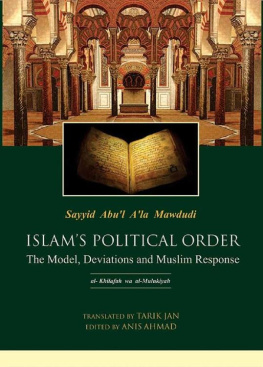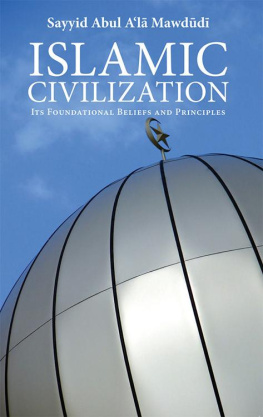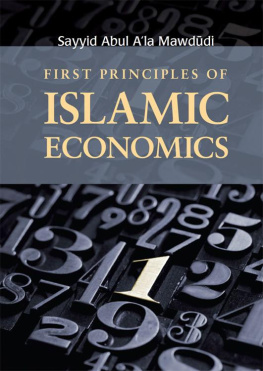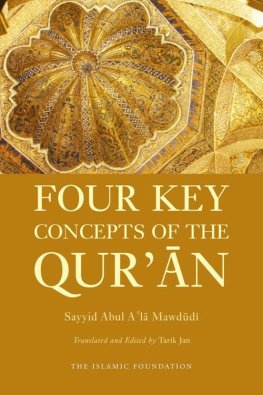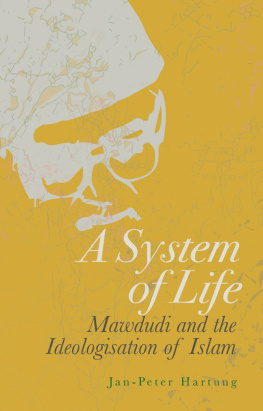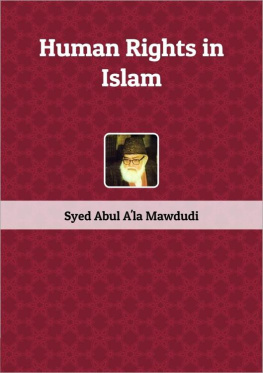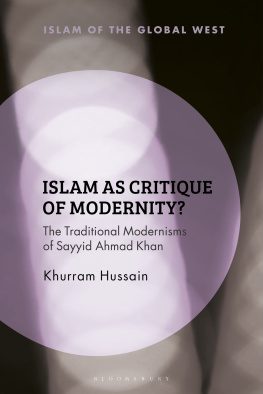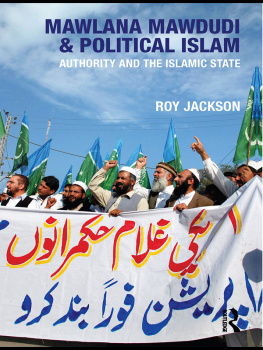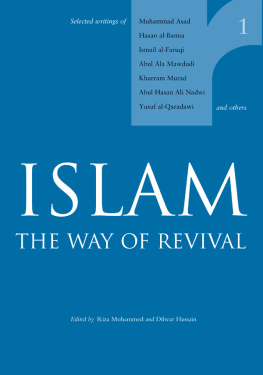Sayyid Abul Ala Mawdudi - ISLAM’S POLITICAL ORDER: THE MODEL, DEVIATIONS AND MUSLIM RESPONSE
Here you can read online Sayyid Abul Ala Mawdudi - ISLAM’S POLITICAL ORDER: THE MODEL, DEVIATIONS AND MUSLIM RESPONSE full text of the book (entire story) in english for free. Download pdf and epub, get meaning, cover and reviews about this ebook. year: 2018, genre: Religion. Description of the work, (preface) as well as reviews are available. Best literature library LitArk.com created for fans of good reading and offers a wide selection of genres:
Romance novel
Science fiction
Adventure
Detective
Science
History
Home and family
Prose
Art
Politics
Computer
Non-fiction
Religion
Business
Children
Humor
Choose a favorite category and find really read worthwhile books. Enjoy immersion in the world of imagination, feel the emotions of the characters or learn something new for yourself, make an fascinating discovery.
- Book:ISLAM’S POLITICAL ORDER: THE MODEL, DEVIATIONS AND MUSLIM RESPONSE
- Author:
- Genre:
- Year:2018
- Rating:3 / 5
- Favourites:Add to favourites
- Your mark:
- 60
- 1
- 2
- 3
- 4
- 5
ISLAM’S POLITICAL ORDER: THE MODEL, DEVIATIONS AND MUSLIM RESPONSE: summary, description and annotation
We offer to read an annotation, description, summary or preface (depends on what the author of the book "ISLAM’S POLITICAL ORDER: THE MODEL, DEVIATIONS AND MUSLIM RESPONSE" wrote himself). If you haven't found the necessary information about the book — write in the comments, we will try to find it.
Sayyid Abul Ala Mawdudi: author's other books
Who wrote ISLAM’S POLITICAL ORDER: THE MODEL, DEVIATIONS AND MUSLIM RESPONSE? Find out the surname, the name of the author of the book and a list of all author's works by series.
ISLAM’S POLITICAL ORDER: THE MODEL, DEVIATIONS AND MUSLIM RESPONSE — read online for free the complete book (whole text) full work
Below is the text of the book, divided by pages. System saving the place of the last page read, allows you to conveniently read the book "ISLAM’S POLITICAL ORDER: THE MODEL, DEVIATIONS AND MUSLIM RESPONSE" online for free, without having to search again every time where you left off. Put a bookmark, and you can go to the page where you finished reading at any time.
Font size:
Interval:
Bookmark:
I S L A M S POLITICAL ORDER
THE MODEL, DEVIATIONS AND MUSLIM RESPONSE
al- Khilfah wa al-Mulkyah
T r a n s l a t e d b y T a r i k J an
Edited by Anis Ahmad
IPS Press is the publishing arm of Institute of Policy Studies, Islamabad an independent think tank dedicated to promoting policy-oriented research. Pakistan A ffa irs, International Relations and Faith and Society are some of the major study areas at IPS.
Islams Political Order
Th e Model, Deviations and Muslim Response
S a y yid A b u l A la Ma w d udi
Translated by Tarik Jan Edited by Anis Ahmad
IPS Press 2018 Published by
IPS Press Institute of Policy Studies
Nasr Chambers, 1, MPCHS Commercial Centre, E-11/3, Islamabad, Pakistan Tel: +92 51 8438391-3 Fax: +92 51 8438390
Emai With permission of Islamic Foundation, UK
All rights reserved. No part of this publication may be reproduced, translated, stored in a retrieval system, or transmitted, in any form or by any means, without the prior permission in writing of Institute of Policy Studies, Islamabad.
Enquiries concerning reproduction should be sent to IPS Press, Institute of Policy Studies at the contact details given above.
ISBN 978-969-448-167-8
Printed in Pakistan by AZ Printers, Rawalpindi
ToC
I am grateful to Professor Khurshid Ahmad, Chairman Institute of Policy Studies, and Dr Anis Ahmad, General Editor of the Mawdudi Essential Project, for their assistance in making this controversial but important book available to English readers. Their cooperation was more than on one count. They discussed the manuscript, argued on my approach, differed on my insistence to have an abridged edition, and came up with constructive ideas to facilitate the project.
Second, the support staff in the Institute of Policy Studies, people in the IT and composition sections who helped as much as they could without dragging their feet on it.
Tarik Jan
A s a normal practice, foreign words and expressions, which are often few, receive italicization in the text with a glossary at the end or in the beginning of a book. In such cases, italicized words may even look nice and do not detract from the uniformity of the text. Their excessive use, however, as in the present case, would have marred the visual landscape of the text, mutilating its uniformity.
Still another practice followed is to italicize foreign expressions and then highlight them by their meanings placed in the parenthesis. In our view, the latter form is overdone and makes no sense. It is enough if we give parenthetical expression to a foreign word without its italicization, for when it is parenthesized we succeed in expressing its foreignness. At the same time, it averts the need for a glossary at the end saving the reader the inconvenience of flipping pages over to the glossary. The transliteration key used is traditional.
This remarkable work of Mawlana Sayyid Abul Ala Mawdudi (1930-1970), when published, for the first time, initiated an intellectual discourse in the region. His view-point on policy measures taken by the third khalifah al-rashid invited strong criticism from the traditional ulama . The Mawlanas purpose was not to criticize the third caliph, as such, but to trace logical and historical roots of the ultimate tragedy the Ummah faced in the form of transition from Khilafah to a hereditary succession which was totally a foreign phenomenon to Islam.
We have abridged the original Khilafat wa Mulukiyat , especially chapters 4 and 5, without blunting its edge or impairing its thesis. We have taken out its appendix for we thought there was no need to defend the sources when the text spoke for itself. We hope this will augment its usefulness without detracting from the fervor and taste of the original.
Today when an ongoing debate is taking place on the nature of Islamic state, political Islam and relation between state and religion this research work of the Mawlana provides a resume of how the Quran and the Sunnah of the Prophet (pbuh), visualize modern Islamic state.
This translation, with minor abridgment, was made possible with the devotion professional excellence and cooperation of my very dear colleague, for over past forty years, Tarik Jan who not only kept the real spirit and vigor of the original work alive in his beautiful translation but also helped in making the text more elaborate for the reader.
Prof. Dr. Anis Ahmad Ph.D
May 20, 2017
T he central theme of this book relates to the nature of the Islamic caliphate and its makeup. How did it actualize itself in the first century of Islam? What were the causes that led to its shift to monarchy? And finally when the change did take place, what was the Ummahs reaction to this change?
To explain it, I have compiled all those pertinent yat (verses) of the Qurn that have relevance to the primary political issues enabling the readers to have a glimpse of the Islamic state that the Qurn wants to have.
The second chapter deals with the principles of Islamic governance in the light of the Qurn, the Sunnah, and the precepts and sayings of the prominent abah (rai Allahu anhu).
The third chapter speaks of the distinguishing characteristics of the pious caliphate as known in the history.
The fourth chapter delineates the causes that led to the shift from the caliphate to monarchy. While the following two chapters discuss the difference between the caliphate and monarchy, the change that the monarchy caused and the way the caliphal fall led to schismatic polarization and conflicts among the Muslims, followed by the ulams effort to bridge the cleavages wrought by the change in the system of governance as typified by Imm Abu anfahs and Ab Ysufs works.
Some contents of this book invited adverse criticism from different segments of society which I have tried to answer in the appendix at the end [now dropped in the English version]. The readers can arrive at their own conclusion by comparing the two.
Abul Al
Lahore
27 afar 1386 A.H./1965
Anis Ahmad
T he contemporary discourse on Islam in general addresses issues relating to Islamic governance, role of religion and religious scholars (ulam and mujtahidn), the status and role of women in power-sharing and non-Muslim minorities in the Islamic political order. Historical analyses of such issues undertaken by both Western Orientalists and Muslim scholars carry an obvious cultural baggage. Some of the classical Western studies still influence the intellectual pursuits of later writers. William Muirs The Caliphate, its Rise, Decline and Fall (1915), betraying the nineteenth century Christian bias, remains a source for many of their misgivings. They avoid considering Thomas Arnolds The Caliphate (1924) because it negates the notion that the caliphate (Khilfah) was a Muslim counterpart to papacy. Julius Wellhausens The Arab Kingdom and its Fall (1927) is still a source of inspiration for many Western students of early Islamic history. Most of the research work follows the traditional Orientalist approach, looking into the emergence of Islamic culture and civilization as the Arab thirst for power and empire building. Some like Sha bns Islamic History a New Interpretation (1999) pursue a tribal and ethnic interpretation of the rise of Islam. Philip K. Hittis History of the Arabs (1937), though a comprehensive effort to look into the total impact of Islam in space-time, failed to rise above the basic misconception of interpreting Islam as Arab history and culture. Consequently, the Islams ascendance in most of the Orientalist works is viewed as the rise of the Arab power. Arabization or urubah is projected as the dominant character of Islamic civilization .
Font size:
Interval:
Bookmark:
Similar books «ISLAM’S POLITICAL ORDER: THE MODEL, DEVIATIONS AND MUSLIM RESPONSE»
Look at similar books to ISLAM’S POLITICAL ORDER: THE MODEL, DEVIATIONS AND MUSLIM RESPONSE. We have selected literature similar in name and meaning in the hope of providing readers with more options to find new, interesting, not yet read works.
Discussion, reviews of the book ISLAM’S POLITICAL ORDER: THE MODEL, DEVIATIONS AND MUSLIM RESPONSE and just readers' own opinions. Leave your comments, write what you think about the work, its meaning or the main characters. Specify what exactly you liked and what you didn't like, and why you think so.

